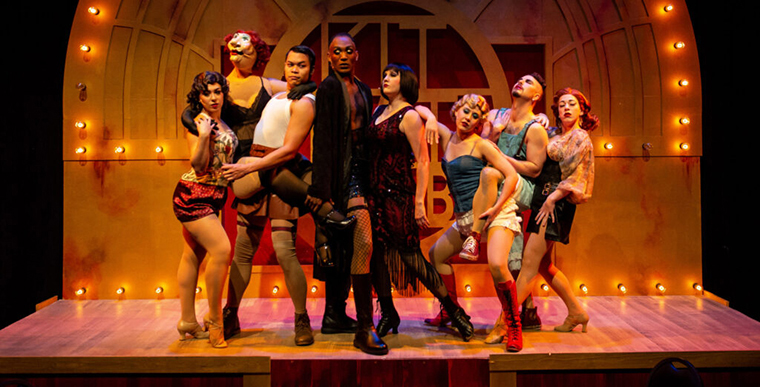
From left, the Kit Kat Klub cast of Zoetic Stage's "Cabaret." From left are Lauren Danielle Horgan, Nate Promkul, Elijah Word, Lindsey Corey, Casey Sacco, Conor Walton, and Sara Grant. (Photo by Justin Namon)
At the end of Zoetic Stage Company’s haunting and convincing production of “Cabaret,” Jewish fruit seller Herr Schultz (a splendid Avi Hoffman) removes his jacket to reveal a concentration camp uniform. Specifically, his gray-striped shirt sports a yellow Star of David. And Schultz exits limping, obviously weakened, troubled, and defeated.
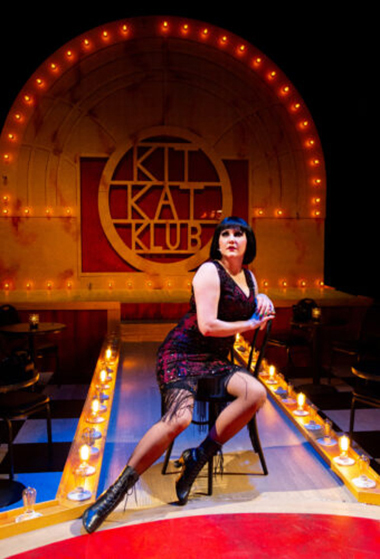
Lindsey Corey on stage at the Kit Kat Klub. (Photo by Justin Namon)
It’s one of the most disturbing but necessary moments to experience in Zoetic’s stellar production, onstage through Sunday, April 7 in the intimate Carnival Studio Theater inside the Adrienne Arsht Center in downtown Miami.
For most of Zoetic’s mounting, Hoffman’s Schultz is a sweet and gentle man who polite, charming, graceful, and full of vibrant life. Sadly, though, he is also naïve enough to believe that governments just come and go and that the Nazis present no danger to him. After all, in addition to being Jewish, he says he is German just like them.
Zoetic’s production does not rely on gimmicks, time period changes, or script alterations to drive home the message that, when it comes to politics, complacency, apathy, and even naivete among citizens can be dangerous. Rather, Zoetic Stage co-founder and artistic director Stuart Meltzer, who skillfully helmed the production, obviously trusts the material as written to wake us up.
Most productions of “Cabaret” do not allow audiences to simply sit back, relax, and enjoy the show behind the imaginary Fourth Wall. As you may know, it separates the audience’s real world from the characters’ fictional world. Rather, in Brechtian fashion, many directors force us to confront the cautionary concept musical’s warnings and themes.
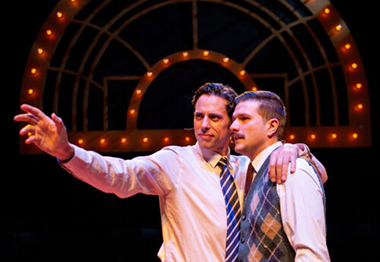
Robert Koutras as Ernst Ludwig befriends Teddy Warren as Cliff Bradshaw. (Photo by Justin Namon)
For instance, in Area Stage Company’s eye-opening production of “Cabaret” in 2018, actors playing Nazi flag-waving activists suddenly and unapologetically marched down the aisle of the audience seating area and vehemently sang the Nazi anthem, “Tomorrow Belongs to Me.” As an audience member, you couldn't turn away.
Two years earlier, during a touring version of the Roundabout Theatre Company’s production of “Cabaret” playing in Miami, actors portraying the cabaret girls warned audience members not to take photographs of them or the scenery. A bit later, Randy Harrison, the actor playing the Kit Kat Klub’s emcee, came into the audience seating area looking for a “lucky” spectator. “I smell fear,” he said playfully before plucking a person out of her seat and onto the stage.
True, a fantastic Elijah Word, as a fierce and flamboyant emcee, doesn’t do that in Zoetic’s production. However, in this mounting, the audience is clearly part of the world of early 1930s Berlin. Word and other actors communicate with audience members and we sit near the stage within the intimate space. In fact, audience members holding VIP tickets sit at tables alongside the stage. Those seated there can practically reach out and touch the performers.
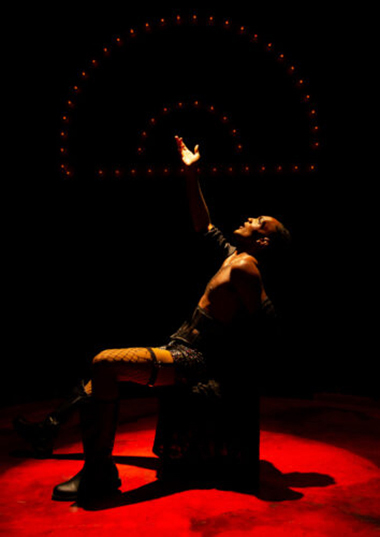
Elijah Word as the Emcee sings "I Don't Care Much." (Photo by Justin Namon)
The stage, as Michael McKeever designed it (with set construction by B.A.R. Scenic), is like a long runway that extends throughout the middle of the theatrical space. Audience members sit on either side of it.
At one end of the “runway,” up two steps, is a dressing room-like area complete with mirrors and lights next to each mirror.
At the other end of the runway stage is a backdrop that reads “Kit Kat Klub.” A vibrant, live orchestra ably accompanying performers in song sits behind that backdrop. Meanwhile, in the middle of the runway stage is a circular space that allows room for actors to perform.
It’s an ingeniously designed stage configuration that practically immerses the audience into the action. Within such an intimate space, the characters’ emotions are more palpable and there is a stronger connection between our “real” world in 2024 and the show’s world, in this case late 1920s/early 1930s Berlin.
While some folks may feel uncomfortable making such a connection, similarities exist between today and the year that the Nazis rose to power. Indeed, acts of anti-Semitism are frighteningly high, minorities (not just Jewish people) are targets for violence and ridicule, and division is rampant. With Neo-Nazi groups increasing, it can be chilling to see a once-vibrant man limping and helpless while clad in the uniform Jewish prisoners wore at concentration camps.
But “Cabaret” is hardly an escapist, bright and big musical; it dares to cover dark, discomfiting subject matter.
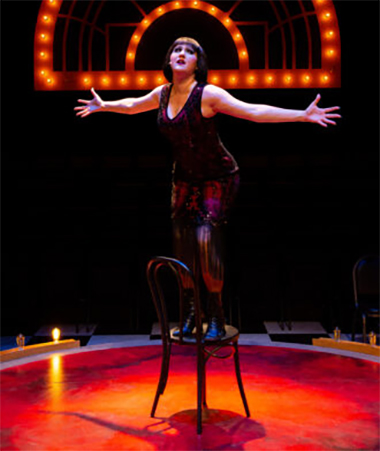
Lindsey Corey as cabaret singer Sally Bowles.
For the uninitiated, “Cabaret,” a 1966 award-winning Broadway musical, features music by John Kander, lyrics by Fred Ebb, and a book by Joe Masteroff. The show’s basis is the 1951 play “I am a Camera” by John Van Druten. That playwright based his play on Christopher Isherwood’s 1939 novel, “Goodbye to Berlin.”
“Cabaret” is a concept musical, one in which a show’s thematic metaphor and message is more important than its plot. As a result, the show’s structure is rarely cohesive or linear.
Again, “Cabaret’s” setting takes place during the early 1930s in Berlin, just as the Nazi party rises to power.
The musical takes place on two levels. On one level is the series of songs inside the decadent, seedy Kit Kat Klub. The numbers provide often wry commentary on plot developments, with the Emcee as a kind of one-man Greek chorus. On another level are plot developments outside the nightclub. You might say that the Kit Kat Klub is a metaphor for apathy and inaction when it comes to mounting threats and danger. The emcee claims that “life is beautiful” inside and there’s no need to worry about anything.
Much of the story involves the romances of two couples. With the Nazis rule drawing closer, the relationships suffer and the inviting Kit Kat Klub becomes increasingly darker. Still, nobody seems to care, thinking that things will work out fine. The song “So What” neatly expresses Fraulein Schneider’s attitude about life. But one line in the song in particular also accurately sums up the kind of attitude that the show is warning against. Specifically, those lyrics are “So who cares, so what?”
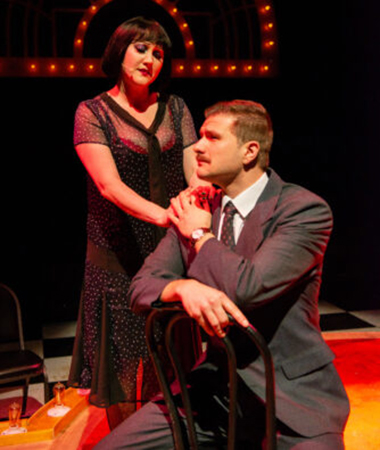
Lindsey Corey as Sally and Teddy Warren as Cliff Bradshaw. (Photo by Justin Namon)
Schneider (a triumphant Laura Turnbull) is a landlady who operates the boarding house in which visiting American writer Clifford Bradshaw (Teddy Warren, deftly delivering a multifaceted performance) stays while searching for inspiration.
Bradshaw struggles in his relationship with British cabaret artist Sally Bowles (Lindsey Corey shining, as usual). Meanwhile, Schneider’s relationship with Schultz seems doomed since the Nazis are rising to power.
Speaking of Schneider and Schultz, real-life married couple Turnbull and Hoffman unsurprisingly demonstrate strong chemistry in their roles. The characters’ love for each other seems sincere and there’s a touching tenderness between them. Undoubtedly, we root for them to marry and are disappointed that they do not.
Individually, the actors, who speak in convincing German accents, shine as well. While Hoffman’s earnest and sweet Schultz endears us to him, Turnbull imbues Schneider with a strong spirit and zest for life that is contagious. Clearly, Turnbull’s indomitable landlady is a survivor. The performer is as pragmatic and unperturbed while singing “So What” as she is believably frustrated during the harsh number, “What Would You Do?” In the former song, Schneider reflects that one should take what life offers so what if it’s not what you expect? The latter song comes toward the end, when Schneider, fearing for her future, calls off her planned wedding to Schultz.
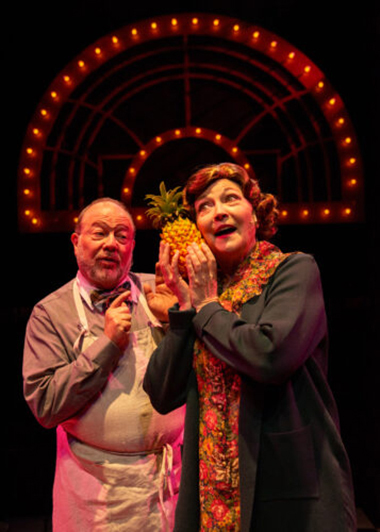
Real-life husband and wife Avi Hoffman and Laura Turnbull sing "It Couldn't Please Me More." (Photo by Justin Namon)
Corey, sporting black hair and dark eyeliner, radiates nervous energy, yet remains natural as high-strung cabaret singer Bowles. Corey, speaking with a convincing British accent, owns the stage as a confident and intense Bowles.
When the character sings the title song, you never sense that she is merely appearing in a commercial to convince people to “come to the cabaret.” Instead, Bowles, who has just argued heatedly with Bradshaw, realizes that he will leave Germany without her. She not only lost her baby, she lost Bradshaw and a chance to escape the increasingly dangerous environment as the Nazis rise to power. In singing the title song, Bowles finalizes her decision to live in ignorance, spending her time in the cabaret as though nothing is happening outside. Wisely, Corey sings the song urgently and anxiously, as though she must convince herself that she’s making the right move. When Corey sings the song, her fingers move fast, as though Bowles is trying to urge others to join her and reassure her.
At first, Warren plays Bradshaw as a wide-eyed, eager man who seems affable yet tense. But as the show progresses, Warren’s Bradshaw grows stronger in his convictions, and he adamantly believes that he must leave Germany before it is too late.
Other cast standouts include Robert Koutras. He plays Ernst Ludwig at first as a friendly, yet somewhat pushy man who becomes loyal to the Nazi party.
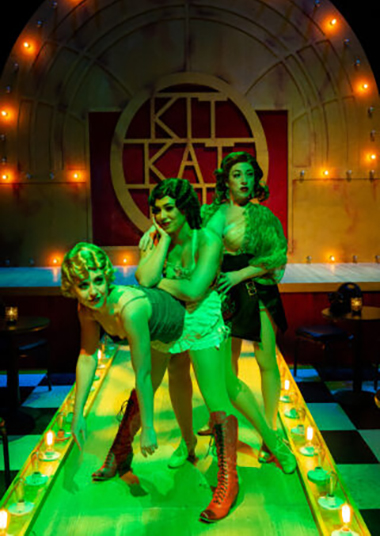
Casey Sacco, Lauren Danielle Horgan and Sara Grant are the Kit Kat Klub girls. (Photo by Justin Namon)
Also, Sara Grant is a bit of a scatterbrained Fraulein Kost, a prostitute who grows stronger in her allegiance to the Nazis. We sense this loyalty as Grant’s Kost, and others sing the reprise for “Tomorrow Belongs to Me” with conviction. The song begins with Victor (Nate Promkul) sweetly singing the seemingly serene song.
As the emcee, Word gives us a mysterious, flamboyant, and androgynous character who slinks, spins, seduces, snarls, and succeeds at winning us over. The actor makes the part his own, never settling for mimicking greats who’ve played the role.
Behind the scenes, director Meltzer finds the humor in the piece, but also ensures sincere moments receive the emphasis they need in order to truly move us. And the pacing and staging are spot on.
In the costume department, designer Dawn Shamburger remains true to the period, while outfitting the actors in dark uniforms, which are appropriate for this dark show.
Lighting wise, designer Becky Montero alternates between intensities to fit the mood of a scene. And she deftly uses colors, such as red and green.
Quiana Major’s sound design ensures that we can easily understand all the dialogue and lyrics.
As I wrote while reviewing a previous local production of “Cabaret,” enjoy the unforgettable songs and empathize with the relatable characters. But keep “Cabaret’s” cautionary message in your conscious mind. One needs to in today’s scary, unpredictable world. Clearly, this musical remains timely and timeless. And Zoetic does it justice.
Zoetic Stage’s production of “Cabaret” continues through Sunday, April 7 in the Carnival Studio Theatre, located inside the Adrienne Arsht Center. The address is 1300 Biscayne Blvd. in Miami. Tickets cost $65 and $85, which includes cabaret-style seating and a complimentary wine or beer. Showtimes are 7:30 p.m. Thursday-Friday, 2:30 p.m. and 7:30 p.m. Saturday, and 2:30 p.m. Sunday. Sunday talkbacks will follow the matinee performance on Sunday, March 24. For more information, call (305) 949-6722 or go to www.arshtcenter.org. or www.zoeticstage.org.




